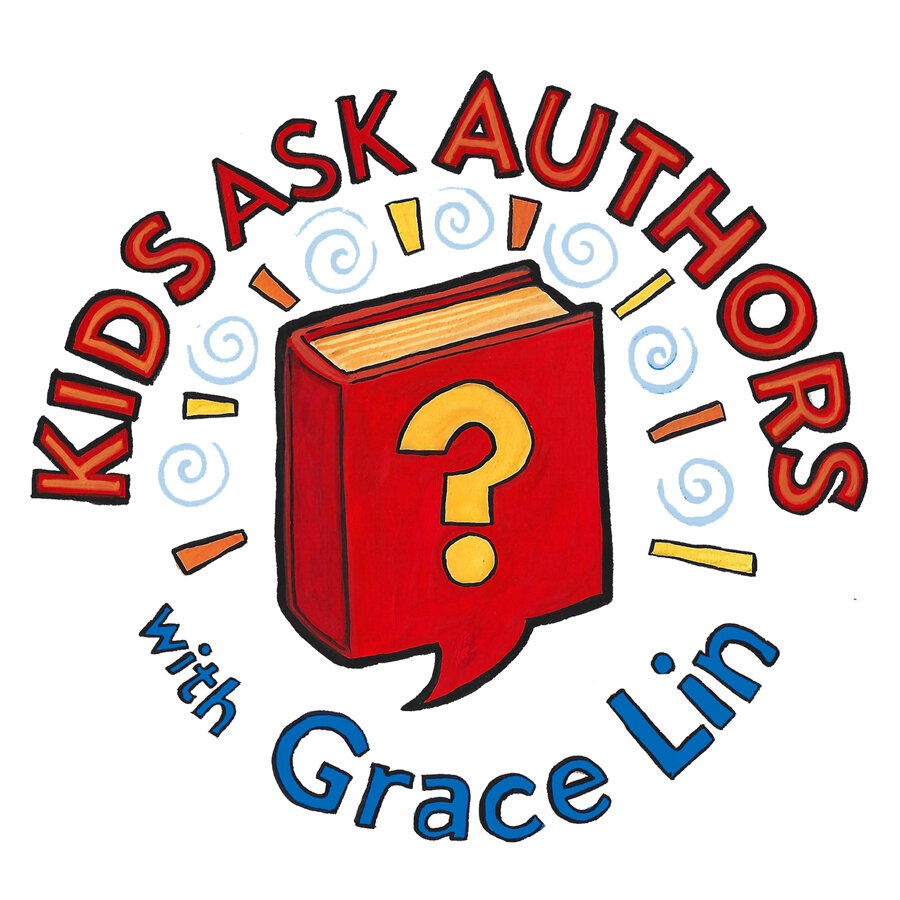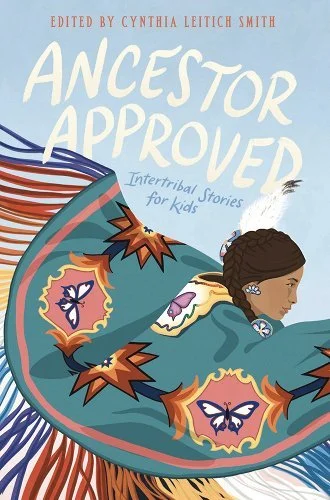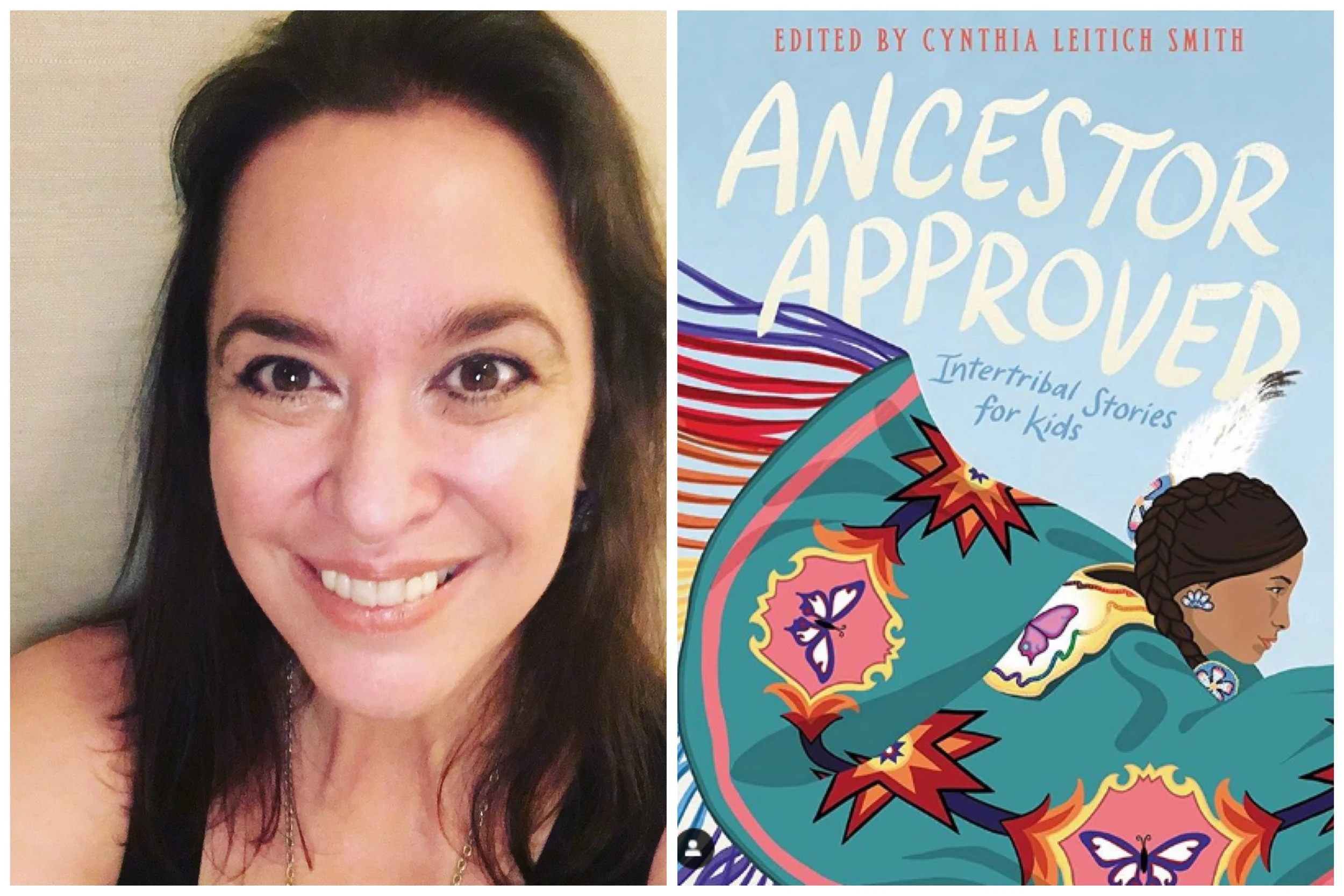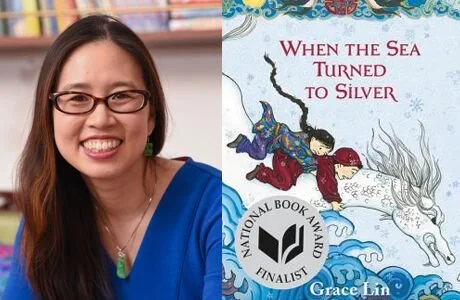Episode #140: Why do you put your own culture in your books? with Cynthia Leitich Smith
Welcome back to Kids Ask Authors! We are here today with special guest authors, Cynthia Leitich Smith and Grace Lin. They are answering the kid question, “Why do you put your own culture in your books?”
TRANSCRIPT:
Grace Lin: Hello, I'm Grace Lin, children's book author and illustrator of many books, including the middle grade novel, Where the Mountain Meets the Moon, and the Picture book, A Big Moon Cake for Little Star.
Today I am here with Cynthia Leitich Smith, the author of middle grade books, like Sisters of the Never Sea, Ancestor Approved: Intertribal Stories for Kids, and Rain is Not My Indian Name. Welcome Cynthia.
Cynthia Leitich Smith: Thank you my friend. That's so cool. I hope you are well.
Grace Lin: I'm so glad to have you on. Are you ready for today's kid question?
Cynthia Leitich Smith: As ready as I'll ever be.
Grace Lin: Okay. Today's question is from a kid named AJ, and AJ asks...
AJ: Why do you put your own culture into your books?
Grace Lin: Why do you put your own culture in your books? That's a thick one.
Cynthia Leitich Smith: It is a big one. When I was a beginning writer, people said to me to write what you know and to write what you love to read. And culture is a part of the identity elements that make up all of us. So when I'm writing what I know, I'm drawing on identity elements like culture. I am Muskogee. Muskogee is a tribal nation within the boundaries of what is currently called Oklahoma. Our people have been here for tens of thousands of years, and we've been united as a nation for some 10 plus thousand years.
Grace Lin: Wow.
Cynthia Leitich Smith: So when I'm thinking about that Muskogee culture, Muskogee language, Muskogee traditions, all do permeate my stories; and so do other identity elements like being from the middle of the continent. I've lived in Kansas, Missouri, Oklahoma, Illinois, Michigan, and Texas. I'm fond of saying I go up and down, not back and forth, and so do my characters.
Grace Lin: Wow, that's awesome. And I think a good reason why, not why you personally put your own culture in your book, but a great reason why having your culture in your books is for other people to discover it and to read about it and to learn about it too. Because I think, just what you told me just in this brief 10 seconds, are things that I didn't know about. So that's wonderful.
Cynthia Leitich Smith: Certainly. When we're thinking about indigenous people, those of us who are native, may be even familiar with our own tribal customs, but not necessarily those of other nations. So for example, being Muskogee, I'm not necessarily someone who knows, as much as I'd love to, about the Navajo or Apache. And that's true whenever I'm reading any book from the perspective of another person. It opens my eyes to their life experience and to their perspective.
Grace Lin: Well, it's interesting because you said you put your culture in your books because that's what you experience. And it's interesting because I have a little bit of a different experience. I put my culture in my books because it's what I don't know. You were saying that you put it in because that's what you do know. And I actually put it in because it's something that I don't know, but it's something that I want to know. Because I've talked about this many times, about how I grew up in upstate New York pretty much rejecting my Asian heritage, and it was only when I grew older, I was like, Oh gosh, I really feel like I missed something and I really want to know more. And it was this search for my heritage and my culture, is why I started writing books about it. So it's an interesting kind of way to get to the same point.
Cynthia Leitich Smith: It's so wonderful that stories define us, but stories also open the opportunity for us to redefine ourselves or to expand our understanding of who we are and who each other is.
Grace Lin: Yeah. I know for me personally, I know that writing these stories really helped me claim it; claim my culture. I think before I always felt like I wasn't Asian enough, I wasn't American enough. But then when I started writing my books, I finally felt like, Oh, I am Asian enough. I can call this culture my own. And I hope that's how people feel when they read our books too.
Cynthia Leitich Smith: I think that one thing to keep in mind is that there's no one right way to be any member of a community. Each of us brings a slightly different experience or even a greatly different experience, and that makes all of us richer in a myriad of ways. When I think about indigenous books for young readers and indigenous people, there is such diversity within. There are folks who are raised on the reservation or in their tribal communities. The vast majority of us grew up in urban areas, so not necessarily deeply immersed in our tribal communities day to day. Due to a lot of reasons; like relocating for college or jobs or government relocation programs. One thing that I've actually become known for is writing stories about middle class suburban native people who may be the furthest thing from the stereotypes that so many folks have amassed from movies and television and mythology, but are really a vital part of indigenous country today.
Grace Lin: Yeah. That's what I think is so important about all the books that we write, as well as so many people write these days. It's that idea that there's so many different ways to share culture, because culture's so multilayered.
Cynthia Leitich Smith: Absolutely. And one of the things that really interests me is intersections between cultures. I'm really excited about a project I'm working on with Kekla Magoon, wherein we're putting together middle grade graphic format novels, or graphic novels, about two characters who are cousins, one of whom is Muskogee like me, and one of whom is black like Kekla, and their best friendship as cousins, and they're both individual perspectives and the things that they have in common. Essentially it's the two of us writing our 12-year-old selves.
Grace Lin: Oh, that sounds awesome. When is that? And is there a title and a date for that?
Cynthia Leitich Smith: Yes. It's called the Blue Star series, and we're looking for it coming out in fall of 2023.
Grace Lin: Ooh, that's so exciting. Okay, I'm going to repeat it for the listeners. The Blue Star series. When did you say? Fall of 2023.
Cynthia Teitich Smith: Fall 2023, illustrated by Molly Murakami. About two cousins, one black and one indigenous, who are working hard to improve their school and community in a diverse urban city.
Grace Lin: Awesome. So you heard it here first listeners, so we'll leave on that note.
All right, well thank you so much, Cynthia, for coming on the Kids Ask Authors podcast today. And thank you AJ for your awesome question. Bye.
Cynthia Teitich Smith: Bye.
Today’s KID BOOK REVIEW comes from Kelly! Kelly is reviewing, Ancenstor Approved by Cynthia Leitich Smith.
The book that I would like to review is Ancestor Approved, edited by Cynthia Leitich Smith. This book is a collection of stories about a powwow, a Native American ceremony involving singing, dancing, and feasting. My favorite story in the book was Rez Dog Rules by Rebecca Roanhorse, because it is about a cute little puppy who wears a shirt that says “Rez Dawg” to help sell T-shirts. I liked this book because it taught me about Native American traditions. Before I read this book, I did not know what a powwow was!
Thank you Kelly!
More about today’s authors:
Cynthia Leitich Smith is the bestselling, acclaimed author of books for all ages, including Rain Is Not My Indian Name, Indian Shoes, Jingle Dancer, and Hearts Unbroken, which won the American Indian Library Association's Youth Literature Award; she is also the anthologist of Ancestor Approved: Intertribal Stories for Kids. Most recently, she was named the 2021 NSK Neustadt Laureate. Cynthia is the author-curator of Heartdrum, a Native-focused imprint at HarperCollins Children's Books, and serves as the Katherine Paterson Inaugural Endowed Chair on the faculty of the MFA program in Writing for Children and Young Adults at Vermont College of Fine Arts. She is a citizen of the Muscogee Nation and lives in Austin, Texas. You can visit Cynthia online at www.cynthialeitichsmith.com.
Grace Lin, a NY Times bestselling author/ illustrator, won the Newbery Honor for Where the Mountain Meets the Moon and her picture book, A Big Mooncake for Little Star, was awarded the Caldecott Honor. Grace is an occasional commentator for New England Public Radio , a video essayist for PBS NewsHour (here & here), and the speaker of the popular TEDx talk, The Windows and Mirrors of Your Child’s Bookshelf. She is the co-host of the podcast Book Friends Forever, a kidlit podcast about friendship and publishing (geared for adults). Find her facebook, instagram , twitter ( @pacylin) or sign up for her author newsletter HERE.
Thank you so much for tuning into to Kids Ask Authors! We would appreciate your continued support on our Patreon page! Please consider becoming a member for all kinds of exclusive perks. https://www.patreon.com/kidasaskauthorspodcast
Order the 2022 WTMMTM CALENDAR: https://shop.carlemuseum.org/category/books/autographed-books/grace-lin
Sign up for Grace's author newsletter: https://lp.constantcontactpages.com/su/kEmJMT3/newsletter



